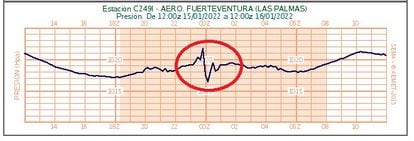On Saturday, January 15, around eight in the afternoon, the barometers that the State Meteorological Agency (AEMET) has installed throughout Spain began to record strange fluctuations that intensified around midnight from the 15th to the 16th. In Pontevedra, in Alicante o In San Fernando (Cádiz) pressure rises and falls of three millibars were measured and in Fuerteventura the oscillation reached seven. "If I see that and I don't have an explanation, I would think it was a mistake or that the observer hit it," says Cayetano Torres, spokesperson for AEMET. The explanation for these oscillations was found in the eruption of a volcano, hours before, more than 17,000 kilometers away.
A pressure wave, like the one produced by strumming the strings of a guitar and generates the sound, but infinitely more powerful, traveled the planet in all directions, leaving its signal in the devices that record changes in atmospheric pressure. When the weather changes, between the storms and the anticyclones, the variations “can reach 20 or 30 millibars”, explains Torres, something small compared to what was observed after the outbreak in Tonga, in what is the second largest explosion of which there is a record since that of Pinatubo, in 1991. However, given its origin, this phenomenon is something that is unprecedented. “It has been an extraordinary phenomenon that meteorologists have not seen in 30 years,” he adds.
Peak variation of atmospheric pressure recorded at the Fuerteventura station after the eruption of TongaAEMET
Like the sound that comes out of the guitar, at about 1,000 kilometers per hour, the waves traveled the Earth in a few hours and were recorded by meteorological services around the world. In some points, such as in Valencia or the Balearic Islands, the state port tide gauges detected an oscillation in the sea level of 20 centimeters. Unlike the tsunami that hit the coasts closest to the eruption, where waves of just over a meter and a half were seen, the origin was not the shaking of the subsoil. On the Spanish coasts, "it was the rises and falls in pressure that caused these oscillations in sea level," Torres points out. "It is as if such a brutal explosion had given a jolt in that huge bathtub that is the Mediterranean, which was stung," he adds.
From the AEMET they consider what happened over the weekend something completely exceptional, although it will not have repercussions from the meteorological point of view.
“Another thing is the particles that the volcano can release, which if produced in large quantities could cause planetary cooling.
But in this case, the cooling produced by the Tonga volcano will be very small”, concludes the spokesman for the meteorological agency.
You can follow
MATERIA
on
,
and
, or sign up here to receive
our weekly newsletter
.




